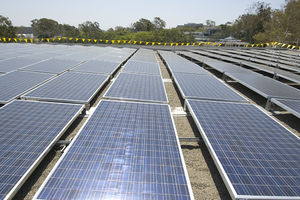
RCSA pours millions into trying to produce a similarly stunning result in solar energy technology
Not long ago if you took the long escalator down to the floor of the Home Show at the Tucson Convention Center, you would have found a surprisingly large number of vendors ready to sell you solar energy for your home. Even in sunny Tucson, however, making a home 100 percent solar-powered is expensive – the cost for my home, according to Tucson Electric Power’s website, is about $28,000 upfront, with a projected payback period of 17 years.
Imagine saying, “Honey, I just talked to the Smiths next door, and they only spent $28,000 to go solar! They get their money back in 17 years! Let’s do it!”
Forget the down escalator. Instead, ascend a stunning marble staircase in a posh office building at Swan Road and Camp Lowell Drive. The stairs turn as you rise to glass doors offering a view of a tiny lobby with no receptionist.
The glass doors are locked. To enter, you must buzz to an unseen person. You are visiting Research Corporation for Scientific Advancement (RCSA), a foundation nearly invisible in Tucson but one known around the world for pumping millions of dollars into many kinds of research.
RCSA wants to see us take our homes solar the way we once bought laser printers and computers, the way we’re buying smartphones today, happily plunking down a chunk of cash for technology that didn’t exist just a couple of years ago and is now a no-brainer purchase.
The solar energy component of RCSA-funded research is headed up by a physicist, Dr. Richard Wiener. Southern Arizona is the perfect birthplace for a game-changing breakthrough in solar technology, so we should all hope Wiener hits a grand slam home run in the World Series of scientific research funding.
Wiener spends RCSA money, in concert with other foundations, mixing up a magic brew of scientists who meet and get to know each other and then collaborate in new and unexpected ways until somewhere, somehow, some time fairly soon, someone, says “Eureka!” and cheap solar energy is born.
Wiener believes the game-changer will come in his lifetime. Then he adds more hopefully, “I think in the next 10 years.” He defines “breakthrough” as cutting the cost of solar power by 80 percent, or more.
Imagine saying, “Honey, the Smiths only spent $5,000 to go solar. They get their money back in two years! Everybody’s doing it!”
Wiener speaks passionately for several minutes about solar energy. Then he remembers he is spending his time with a non-scientist who has exactly a one-in-a-gazillion chance of inventing the iPhone of solar power.
Suddenly, he looks uncomfortable and realizes he should be back in his office thinking about the 50 or so mathematicians, engineers, physicists, chemists and other scientists he’s busy shepherding.
Once a year, right here in Tucson, RCSA brings together this eclectic combination of brain power to meet in person to present, discuss, and collaborate in ways that, RCSA believes, will enable a group of people to click and make the game-changer appear.
In 1970, a guy name Steve worked at a mainframe computer company, where he met another Steve working a summer job there.
Together, they decided to form a company and make a computer ordinary people could afford and would like. Steve and Steve, Wozniak and Jobs, named the company Apple.
Years before Steve and Steve met, a couple of engineers named Dave and Bill got together and started working in a one-car garage in Palo Alto, Calif., inventing stuff. They flipped a coin to determine whose name would come first in the company name. The result: Hewlett-Packard. HP. A game changer: the laser printer.
Wiener and RCSA don’t want the future of the world’s energy supply to be determined by whether a couple of guys named Steve and Steve, or Dave and Bill, happen to meet and invent great things, like the personal computer or the laser printer, or later, the iPhone.
Instead, RCSA pours millions into trying to produce a similarly stunning result in solar energy technology.
Related articles
Bookmark this page for “solar power” and check back regularly as these articles update on a very frequent basis. The view is set to “news”. Try clicking on “video” and “2” for more articles.







